Aug 23, 2024 – Bad Ragaz, Switzerland, Day 1 of Psychology Symposium
Hello. Today is the first day of a 3-day psychology symposium in Switzerland on the theme “Tracing the Footsteps of Guilt” (Der Schuld auf der Spur).
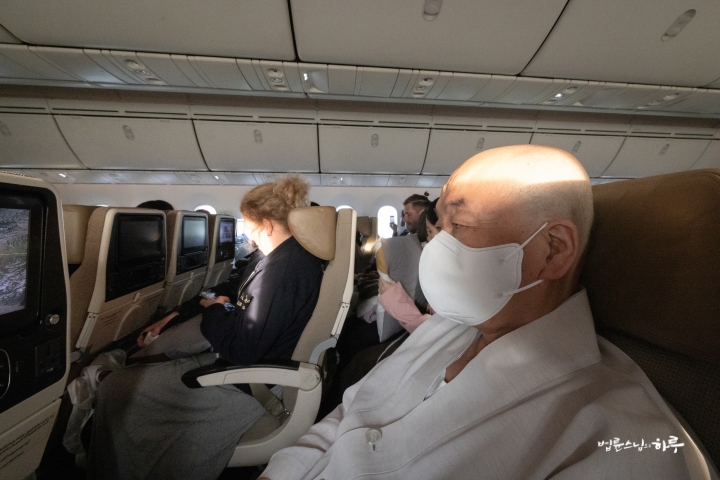
Sunim departed from Incheon Airport at 6 PM yesterday, spent 4 hours at the layover in Abu Dhabi, then left Abu Dhabi Airport at 2:45 AM and arrived at Zurich Airport in Switzerland at 7:20 AM local time. It took 18 hours to travel from Korea to Switzerland.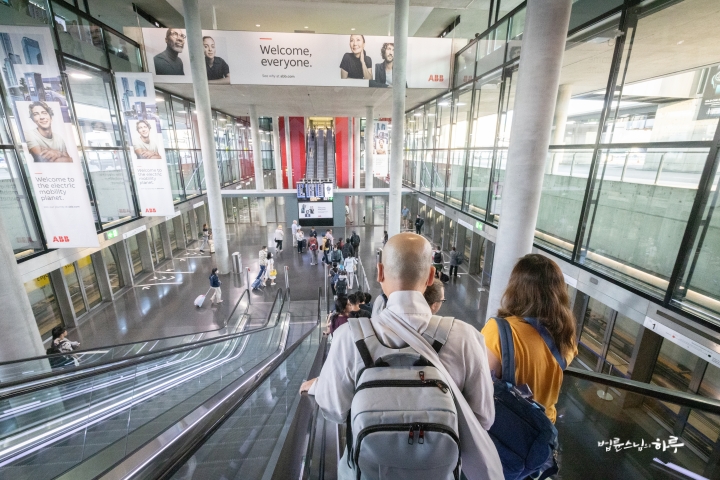
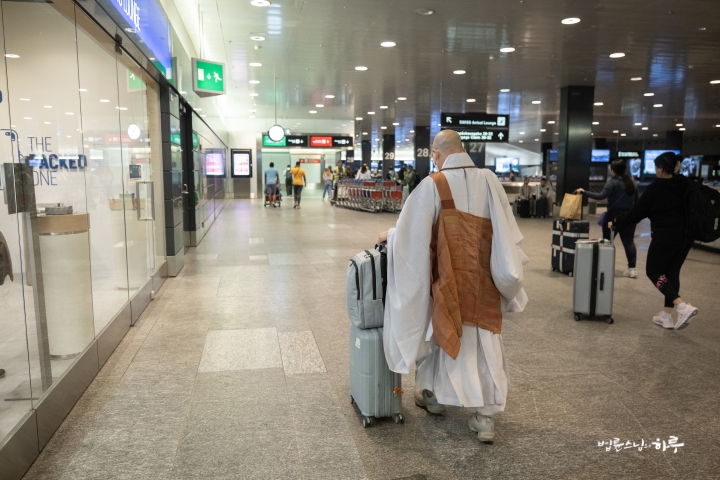
After retrieving his luggage, Sunim was greeted at the airport by Jungto Society members Im Hye-ji, Kwon Beomi, and Kwak Young-ok. Sunim exchanged greetings with the members with a warm smile.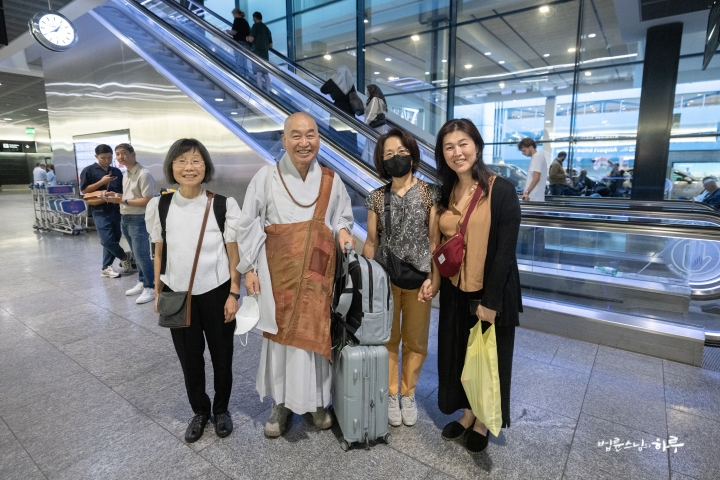
They immediately drove from the airport to Bad Ragaz, where the symposium is being held. Beautiful Swiss scenery unfolded outside the window. As they left Zurich, green mountains, clear lakes, and quiet villages stretched out before them. The scenery was breathtaking.
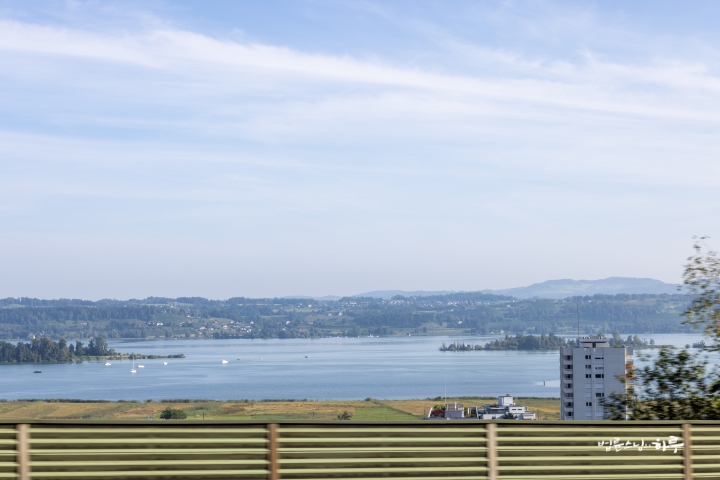


After about an hour and 30 minutes of driving, they arrived at the symposium venue at 9:40 AM. Sunim attended the symposium without even unpacking his luggage.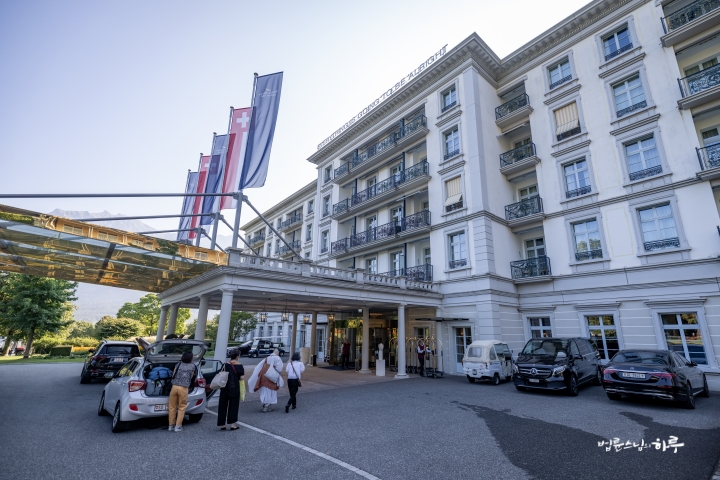
This symposium is an academic event held in Bad Ragaz, Switzerland, exploring the theme of “guilt” in various contexts such as culture, history, economics, and law. Last year, when Sunim visited Munich, Germany, psychologist Jeannette Fischer came to where Sunim was lecturing and earnestly requested to invite him to this symposium.
This event, held from August 23rd to 25th, is organized in conjunction with the Triennale Bad RagARTz, an international sculpture exhibition. The Triennale Bad RagARTz is a unique event held every three years where the entire Bad Ragaz area transforms into a vast outdoor gallery. Artists from around the world participate and exhibit various sculptures, with artworks installed in parks, streets, and squares throughout the city, providing artistic inspiration to visitors. This symposium, in particular, is designed to explore the themes of “guilt” and “responsibility” both artistically and academically, in line with the theme of the Triennale.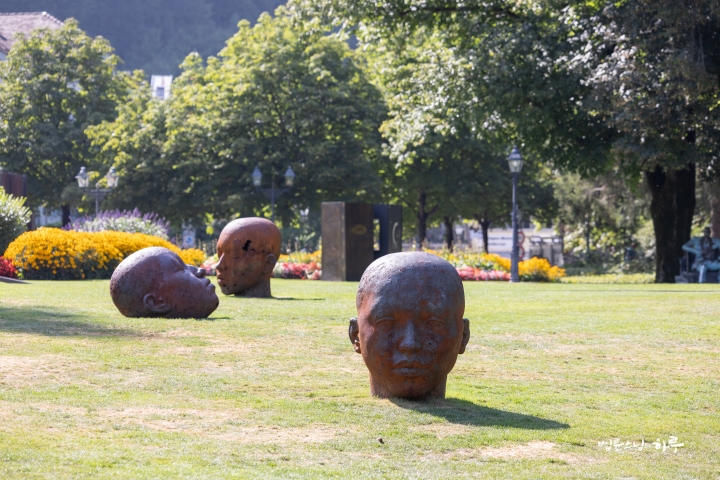
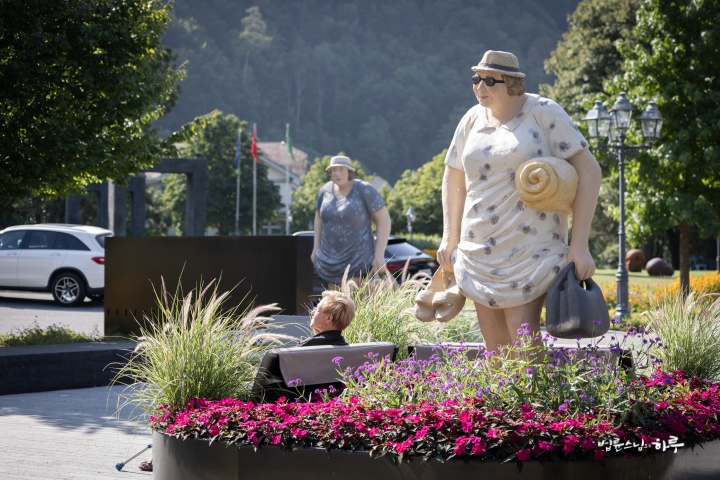
Upon arriving at the symposium venue, psychologist Jeannette Fischer was giving the opening keynote speech.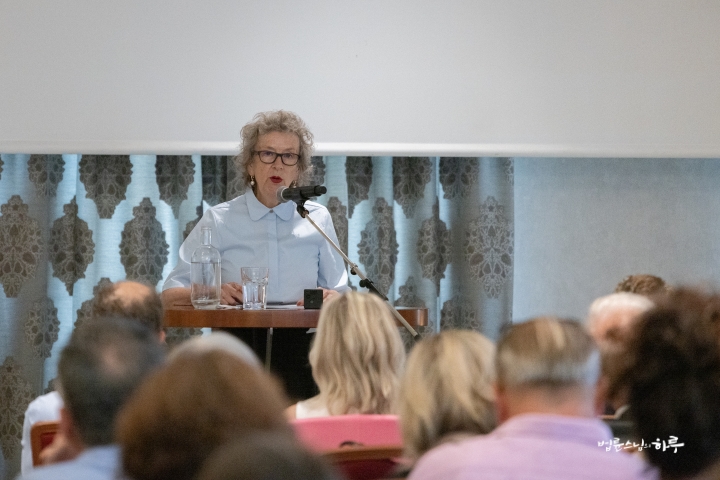
To avoid disturbing other attendees, Sunim sat in the back, slightly away from the audience seats, and listened attentively to the lecture content through Im Hye-ji’s interpretation.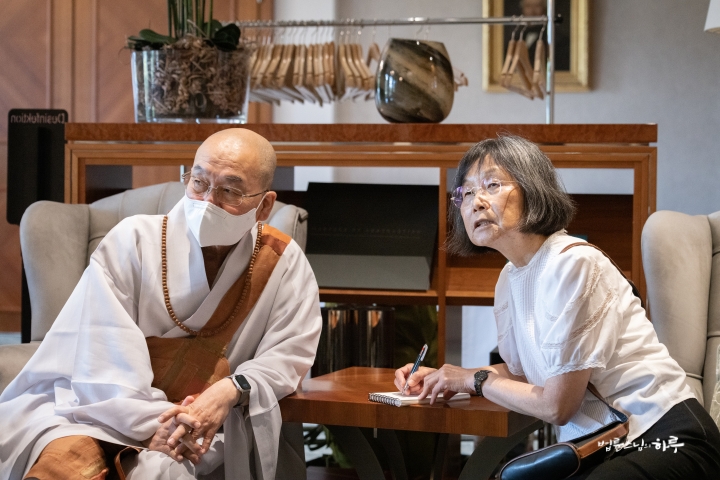
Next, Markus Schulz, former dean of Vallendar Theological University, lectured on sin and salvation from a theological and doctrinal perspective. The audience engaged in lively discussions, asking various questions such as “Is suicide a sin?”, “Do you really believe in God?”, and “I’ve been campaigning against child abuse in the church for 15 years, do you think the Catholic Church is also responsible?” Sunim listened attentively to the lecture content but paid particular attention to the questions asked by the audience.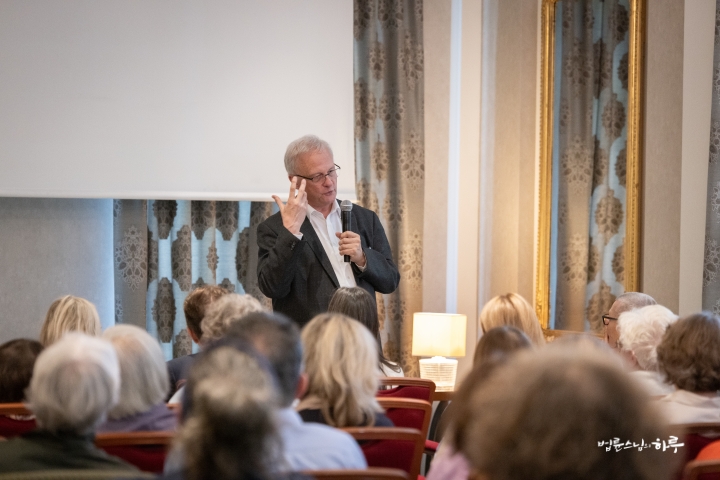
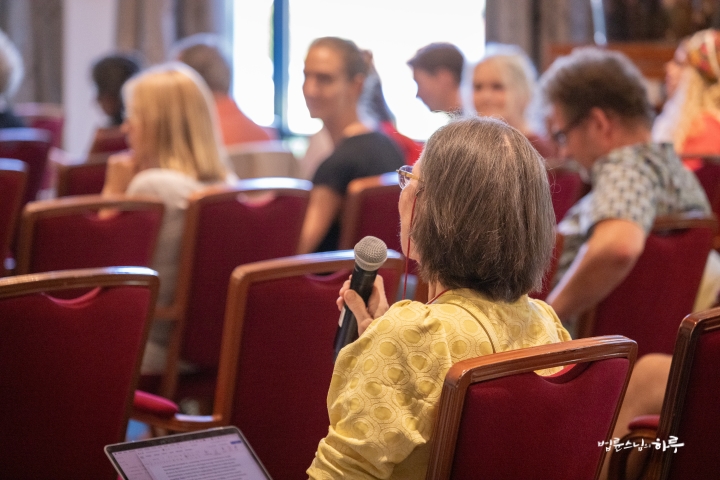
Following this, Professor Ueli Mäder, emeritus professor of sociology at the University of Basel, gave a lecture. Professor Ueli Mäder discussed the concept of sin from a social perspective through the topic “Are there no sinners, and is society to blame?”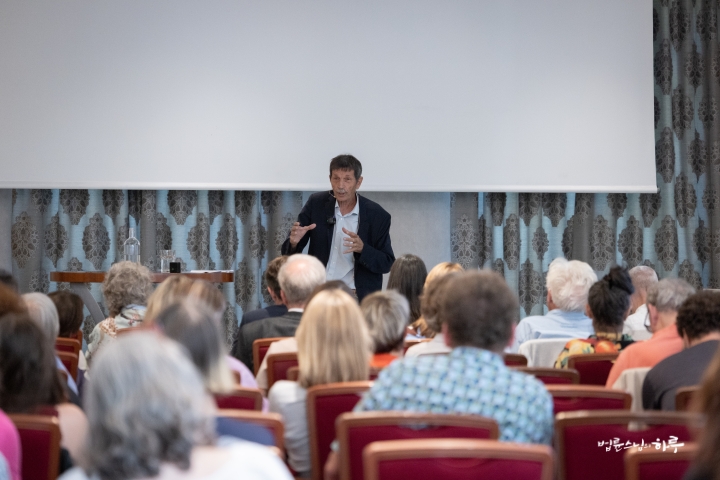
Professor Ueli Mäder explained that guilt is formed internally in individuals and then objectified within social structures. He analyzed how sin is revealed and hidden through examples of social inequality.
“Sin is not a problem of specific individuals, but a phenomenon that emerges from the intertwining of social structures and human psychology within that society. The concept of guilt is often used to conceal and justify social inequality and oppression. Therefore, the perception of sin can be formed differently within social structures and cultural contexts.”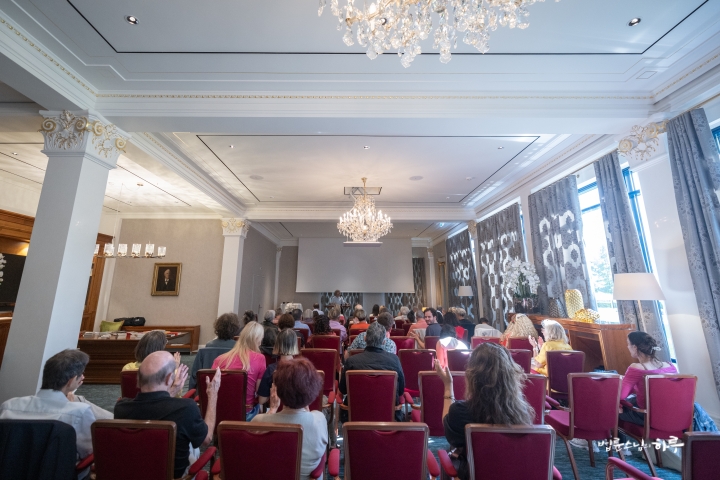
He also explained how a dialectical understanding of social structure and psychology can contribute to the acceptance and liberation of sin. Professor Ueli Mäder’s emphasis on the connection between sin and social inequality left a strong impression on the participants.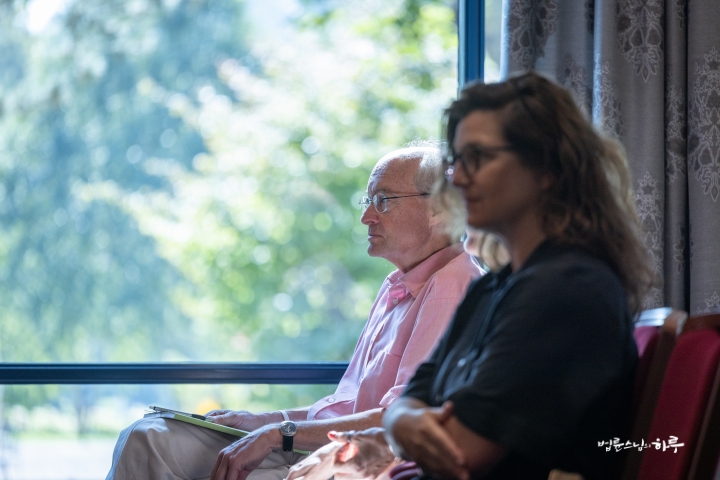
As the presentations and discussions were heating up, Sunim headed to his accommodation to conduct the Friday Dharma Q&A live broadcast.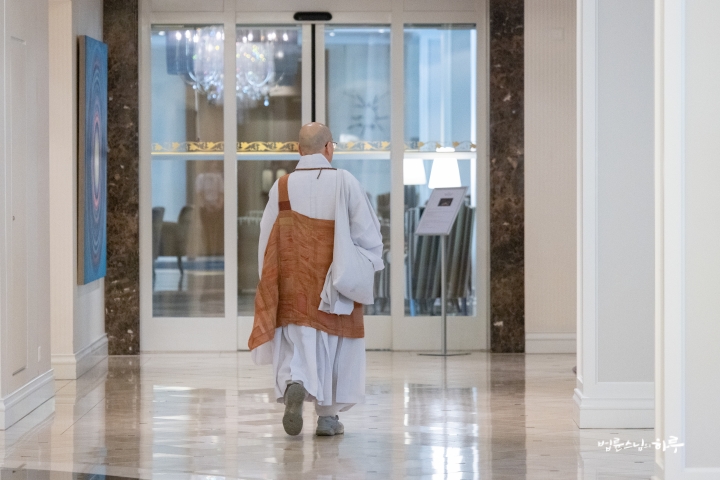
After setting up the broadcasting equipment at the accommodation, Sunim started the Friday Dharma Q&A live broadcast at 7:30 PM Korean time, which was 12:30 PM local time. With about 4,000 people connected to the live broadcast, Sunim gave his opening remarks.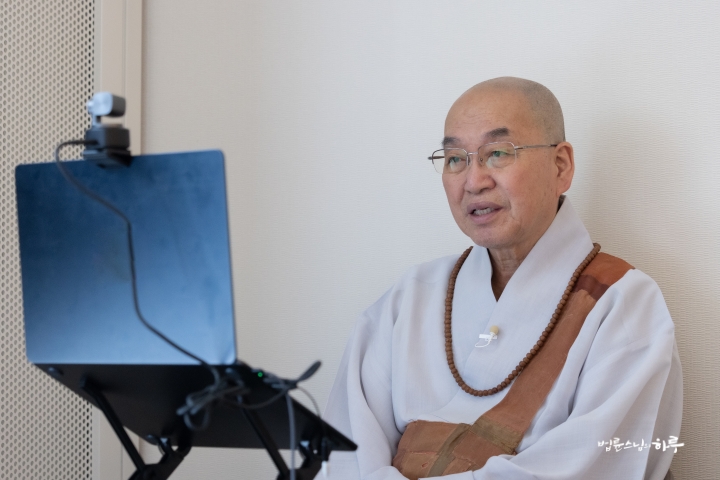
“I arrived here in Bad Ragaz this morning. Bad Ragaz is a Swiss resort town, close to Liechtenstein. The reason I came here is to attend a psychology symposium. A three-day symposium is being held on the themes of ‘sin, sense of guilt, and guilt.’ I am scheduled to have a Dharma Q&A session with the participants on the last day. Today, I am listening to the participants’ presentations, discussions, and questions.”
Then, people who had requested questions in advance asked Sunim questions. Four people pressed the raise hand button and had conversations with Sunim.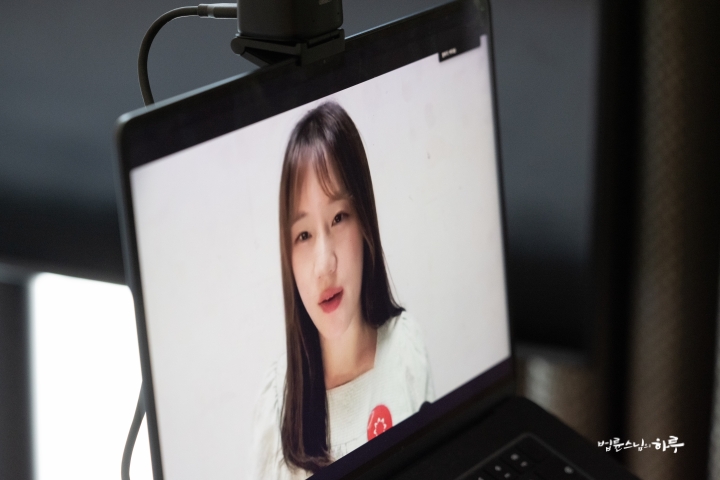
The first questioner lost a child during childbirth and is preparing for adoption to have another child, but her husband and family are against it. She asked for Sunim’s advice on what to do. The second questioner said that babies keep coming, and while discussing vasectomy with her husband, they suddenly conceived their third child. She asked for Sunim’s advice on whether it would be okay to have an abortion.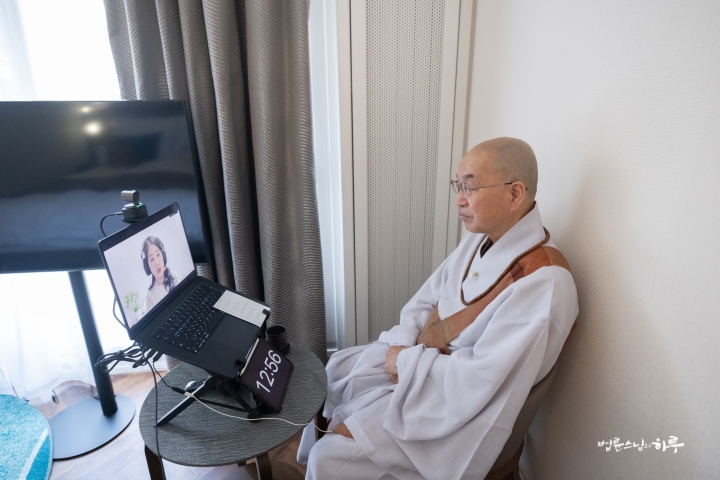
While Planning for My Husband’s Vasectomy, We Unexpectedly Conceived Our Third Child
As one person wants a child but is having difficulty, and another doesn’t want a child but has conceived, Sunim smiled at the contrasting questions and answered.
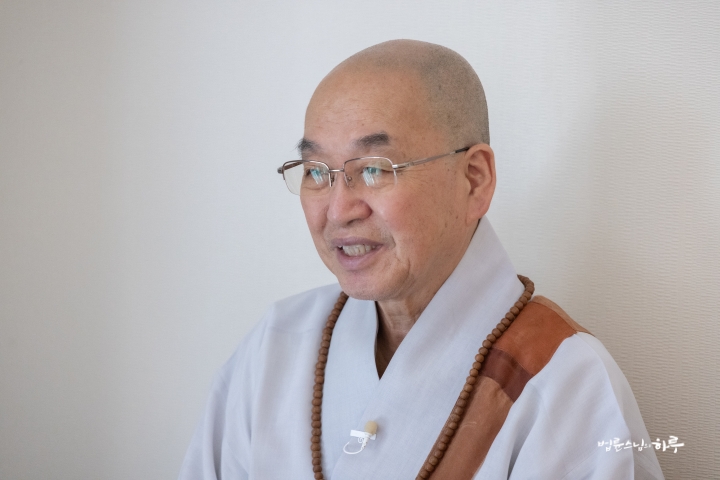
“You heard the previous questioner’s story, right? That person wants a child but can’t have one, while you have conceived one you don’t want. How about if you give birth to the child and send it to the previous questioner? That would be good for both you and the previous questioner. The previous questioner said they would even pay 100 million won to have a child. I don’t mean you should actually do this, but I’m talking about human psychology. If we don’t like something, we want to get rid of even a child that has been conceived, and if we want something, we try to buy it from elsewhere even with money. This is human desire. It’s because of being caught up in desires that our lives become difficult, and we can also harm others.
The current issue in our society regarding abortion is ‘Is the right to life of the fetus more important? Or is the mother’s right to choose more important?’ These two are currently in sharp conflict. This should be resolved by considering the positions of both the fetus and the mother, but third parties are asserting their own opinions. It’s not desirable for third parties to oppose abortion or define it as a crime. They can give advice or express opinions if asked by the parties involved, but they shouldn’t assert it. One side of our society considers women’s rights and self-determination important and supports abortion. The other side, centered around conservative religious people, opposes it, saying that the life of the fetus is given by God. Amidst these extremes, there is a social consensus that allows abortion up to a certain week of pregnancy. It varies by country, but abortion is allowed from as early as 12 weeks to as late as 24 weeks of pregnancy. Currently in our country, abortion can be done according to the mother’s will up to 14 weeks of pregnancy. It’s not recommended, but there’s no legal responsibility. After 14 weeks of pregnancy, it becomes illegal. This is because from that time, the fetus is considered to start becoming an independent life with features. After 14 weeks of pregnancy, abortion is only possible when there is a risk to the mother’s life and health.
The questioner is currently legally able to have an abortion, but it would be immoral to do so simply because you already have two children. Severe morning sickness is also not a reason for abortion. If the hospital determines that the fetus is endangering the mother, then you can have an abortion. However, severe morning sickness in early pregnancy is likely to improve as time passes. Since the legal deadline hasn’t passed yet, it would be good to wait and see for about a month more. If there’s no particular problem with the mother’s health, it’s best to give birth and raise the child. Personally, it’s about giving birth to and raising your own child, but from a national perspective, it’s a patriotic act in a time of low birth rates. If you have an abortion, the psychological guilt can last for a long time. Government policies are also moving in the direction of supporting most of the childcare costs, so in this aspect too, it would be good to have the child.
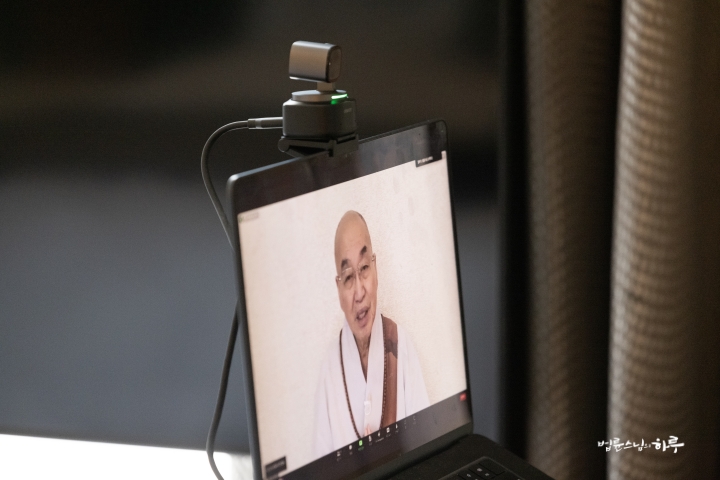
If you decide to have an abortion, it’s best not to make the decision alone. Instead, get a doctor’s diagnosis and consult with your family. This can help reduce feelings of guilt. Otherwise, it may lead to conflicts within the family later on.
First, if there are no particular health issues for the mother, it’s better to give birth and raise the child. Second, if there are health concerns for the mother, abortion can be an option, but if other treatments can resolve the health issues, it’s preferable to have the baby if possible. There’s no need to deliberately try to have a child that isn’t conceived naturally, but conversely, it’s not advisable to intentionally terminate a pregnancy that has occurred. I believe it’s best to follow the laws of nature.
“Yes, I understand. But I’ve heard that if the mother continues to have negative thoughts, it’s not good for the fetus. What should be done about this?”
“The mother’s negative thoughts are not directly transmitted to the fetus. When we have negative thoughts or get angry, our body becomes tense. In fact, it’s not just the act of killing someone that’s a sin; even thinking ‘I want to kill that person’ creates significant psychological tension in our subconscious. Since the fetus is currently a part of your body, if the uterus becomes tense, there’s a risk to the baby’s physical health. Whether the mother has depression, negative thoughts, or conflicts with her husband, any psychological discomfort and persistent negative thinking can be detrimental to the baby’s physical health. However, this doesn’t mean that thoughts of ‘I want to have an abortion’ are transmitted to the fetus, causing the child to resent the parents later. The point is that when parents have negative thoughts, their body becomes tense, and this tension can interfere with various bodily functions of the fetus, so it’s better not to have negative thoughts.
If you have severe morning sickness and your body keeps hurting, you should go to the hospital for treatment. It’s not advisable to think, ‘Maybe it would be better if I had an abortion’ or ‘I didn’t want this, but I got pregnant anyway.’ If you’re in pain, just monitor your health as it is and seek treatment.
However, if the mother’s health is so poor that the pregnancy poses a threat to her life, abortion can be an option. In such cases, there’s no need to feel guilty. If a choice must be made, we have to prioritize the life of the mature person over the undeveloped baby. In this situation, we shouldn’t view it as ‘the mother lived by killing the baby.’ When both lives are at risk, it’s better for at least one to survive. In the past, when the choice was between the mother’s life and the baby’s, people often chose to save the baby at the expense of the mother’s life. This shows how precious they considered the baby’s life. However, today, the mother’s life is often given slightly more priority over the fetus.
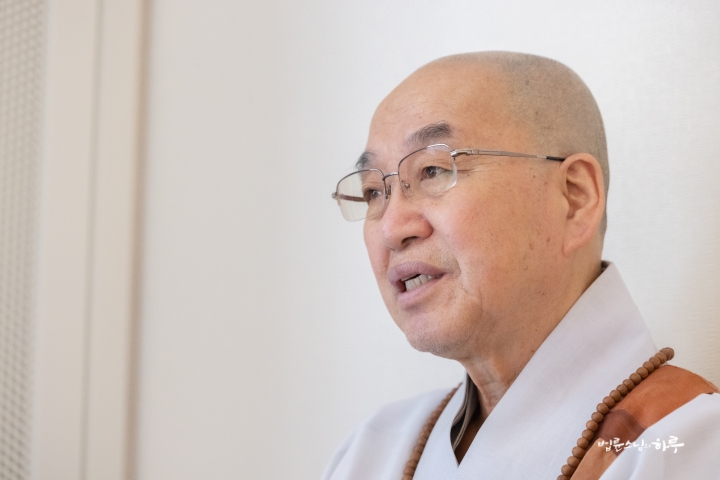
Therefore, there’s no need to dwell on negative thoughts. Even if negative thoughts keep coming, you don’t need to feel guilty about them. It’s understandable to have such thoughts when you’re struggling. However, getting angry and irritated with children can have a very negative impact on their psychology. So, if your physical health is poor right now, you should quickly take medication or seek treatment to prevent harm to your two children. When you get irritated with your husband or adults, it may be unpleasant, but it doesn’t become trauma or a lasting wound. However, when you get irritated with young children, it all becomes a wound for them. So, as a parent, I’d like to advise you to be a little more mindful of this.”
“Yes, as you said, Sunim, I will focus on prenatal care, think positive thoughts, maintain a healthy body, and work towards creating a happy family. Thank you.”
Sunim continued to receive questions from the audience:
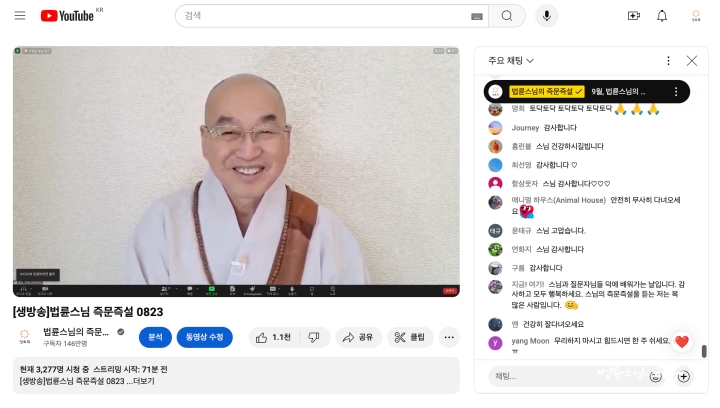
• “My 9-year-old son has ADHD. When he doesn’t get what he wants, he screams, throws things, and kicks. Taking care of him is very difficult.”
• “I want to become someone who can get along well with my spouse and have a happy marriage. How can I do that?”
By the time the conversations ended, it was past 1:40 PM. Sunim went to the dining hall in the accommodation and had lunch outdoors with Jungto Society members.
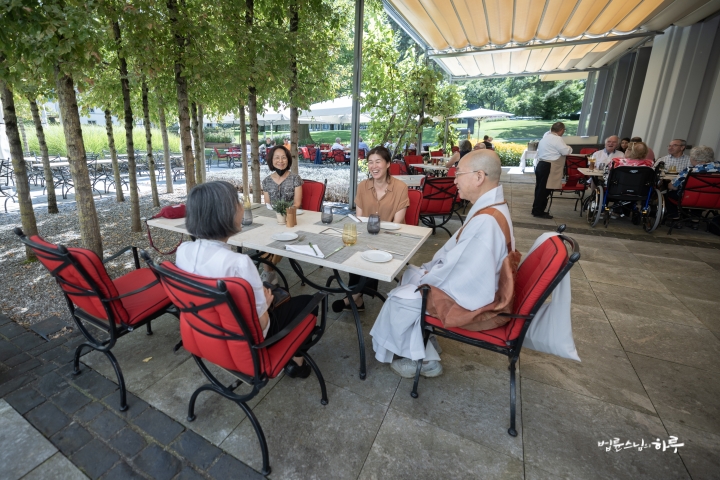
Sunim was very hungry, not having eaten since the in-flight meal early in the morning. He had lunch while chatting with the members and returned to the symposium at 2:30 PM.
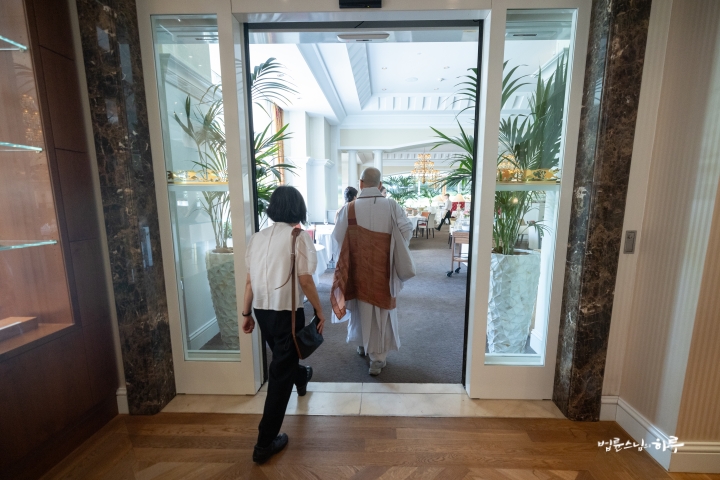
The afternoon session also featured various lectures on the theme of “sin.” First, Nam Jelman gave a lecture on “Guilt and Its Cultural Influence.”
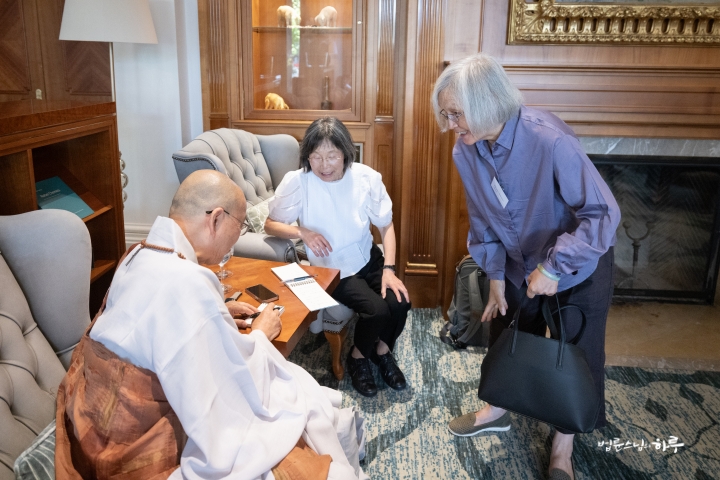
Nam Jelman is a Korean expatriate who studied philosophy, German history, and art history, and received a Ph.D. in philosophy with a focus on Hegel’s philosophy of history. After moving to Switzerland in 1995, he has been working as a journalist focusing on Korea and East Asia, writing numerous essays on Korean culture and giving lectures. He played a bridging role in enabling Sunim to attend this symposium.
Nam Jelman emphasized that guilt is not simply an individual emotion, but a complex phenomenon formed under the influence of society and culture. In particular, he explained how guilt arises in people’s daily lives and how people behave accordingly.
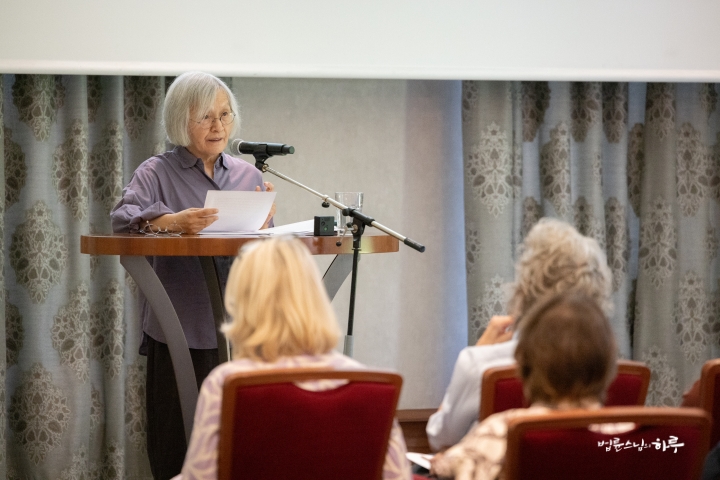
Guilt and Its Cultural Influence
“Guilt mainly arises when people experience conflict between social norms and personal beliefs. It is a complex cultural phenomenon beyond a simple emotion. Two prerequisites are necessary for guilt to be established. First, there is a normative order that determines what is right and wrong. This normative order must be internalized by individuals through the socialization process, through which people behave in accordance with social expectations. Second, it is how human behavior is connected to the normative order. People reflect on their behavior based on the normative order, and as a result, they feel guilty.
Guilt can manifest differently in historical and cultural contexts. For example, certain behaviors may be considered sinful in one culture but not problematic at all in another. Historically, the concept of ‘guilt’ has evolved and taken various forms over time. The specific forms of guilt vary according to each society’s class, moral norms, and legal sanction systems. Guilt is not simply an individual emotion, but a cultural phenomenon in itself. It has a profound impact on people’s thoughts, behaviors, and ways of life. This cultural influence creates different ways of understanding and dealing with guilt.”
She explained what the cultural influence of guilt means by citing examples from societies with completely different religious and philosophical traditions, such as Korea.
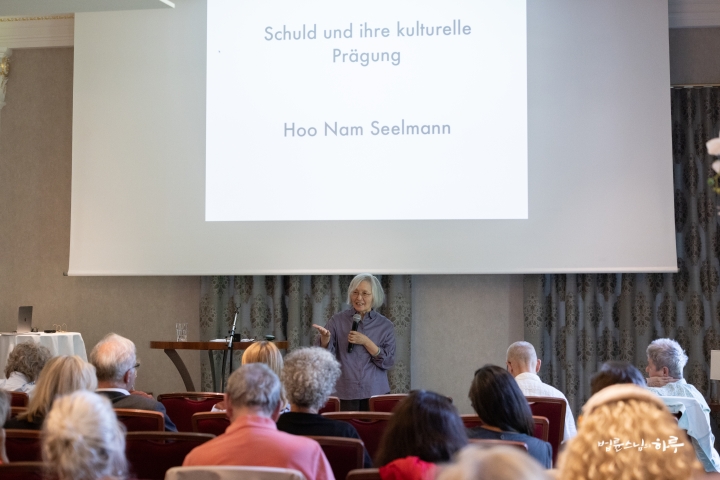
“In Korea, Confucian traditions and Buddhist values are mixed, and guilt manifests in a unique form. In Korean society, guilt is often connected to a sense of responsibility towards family and community. Each society has its own approach to guilt, and these approaches are deeply rooted in people’s daily lives and value systems.”
It was possible to think about how complex and multi-layered the concept of guilt is.
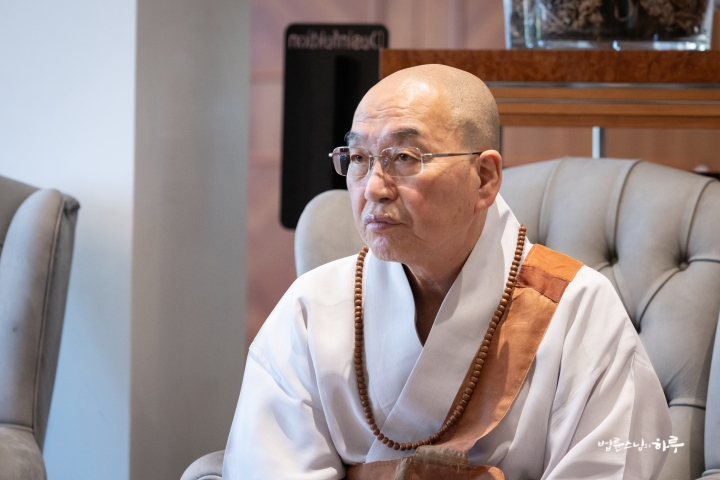
Next, Andrea Taormina gave a lecture on “Moral Sin and Legal Sin.” Andrea Taormina compared in depth the differences between moral sin and legal sin, especially explaining how guilt is determined in criminal trials and how these decisions affect perpetrators and victims. He emphasized that while moral sin is based on individual ethical beliefs and value systems, legal sin is defined according to laws set by society.
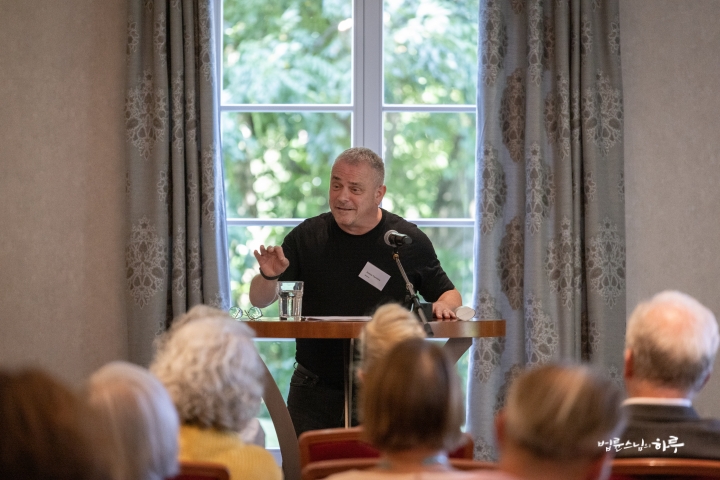
“Legal sin is judged by specific legal standards, and these standards can change according to the times and social context. On the other hand, moral sin is defined by individual conscience and social moral customs.”
He also explained the criteria for guilty verdicts in criminal trials and the legal and moral dilemmas that arise in the process, emphasizing that “the boundary between law and morality is not always clear. Legal decisions do not always follow moral decisions.” Through his presentation, we could understand the complex relationship between law and morality.
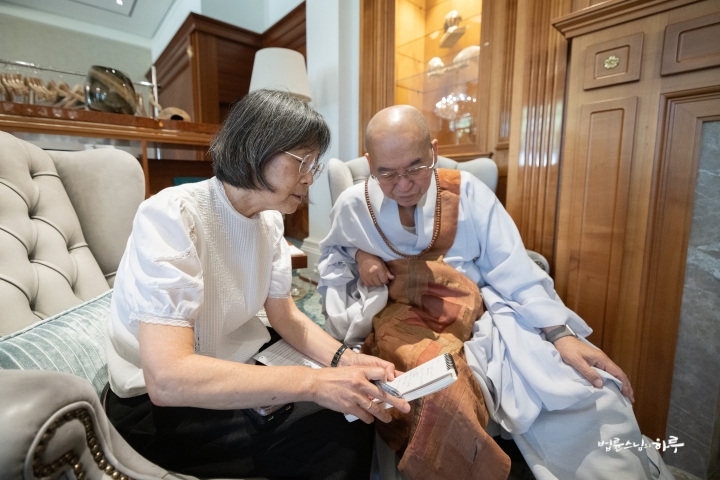
After finishing the presentations and discussions on the first day, Sunim walked with the symposium participants to the dinner venue. The dinner venue was Dorfbad.
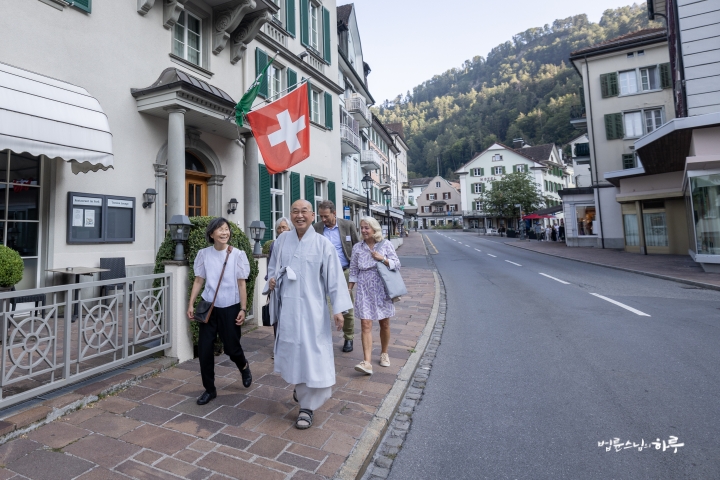
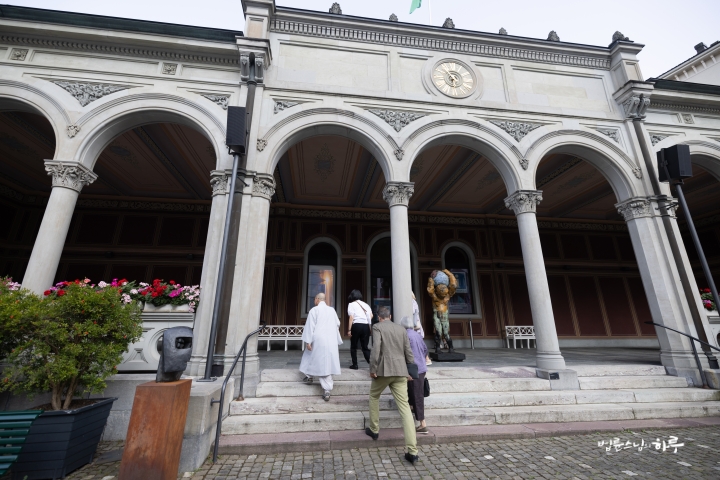
Dorfbad is a historic bathhouse building located in Bad Ragaz, currently used as a museum and exhibition hall. This place, which was used as a spa in the past, is now used as a venue for art exhibitions and cultural events.
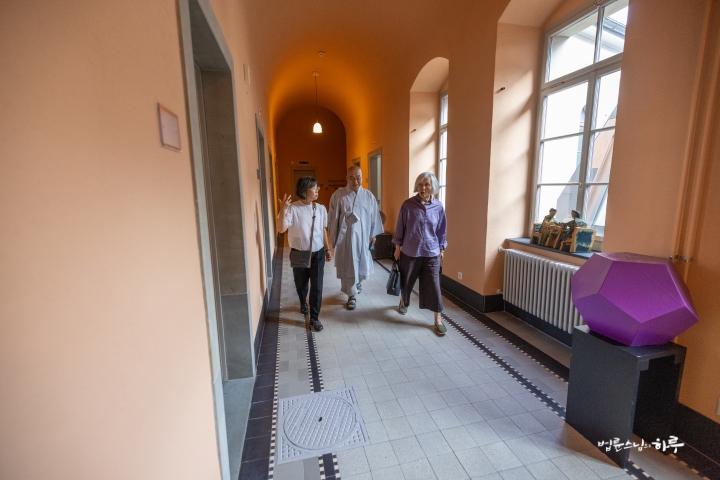
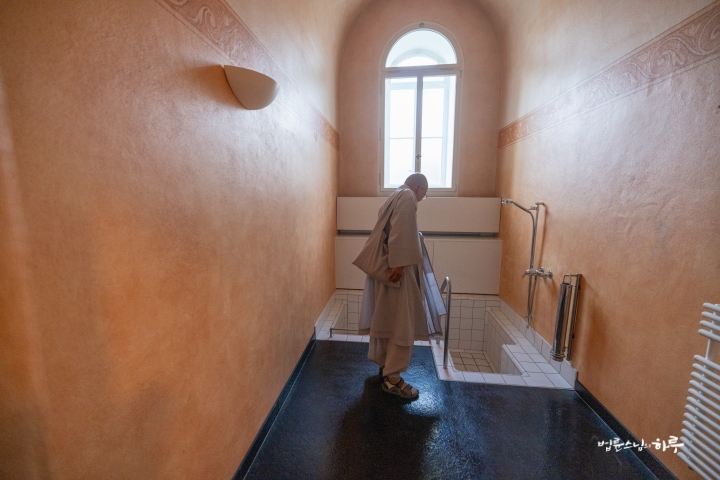
Sunim and the participants had dinner while freely standing or sitting and chatting in a cozy atmosphere.
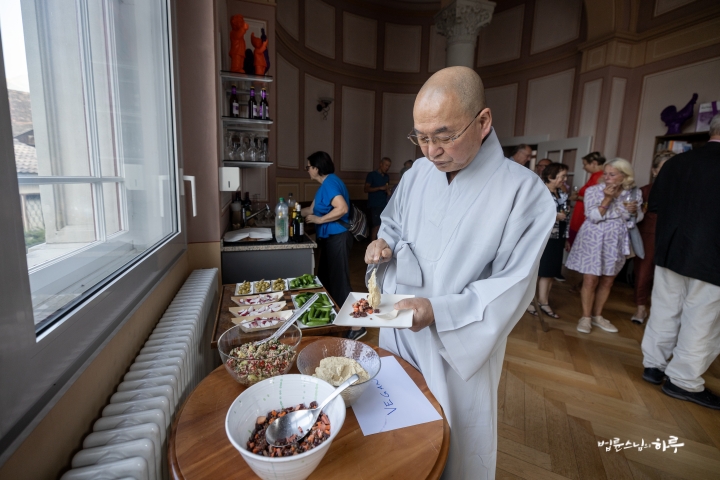
During dinner, the host presented Sunim with a hat that her daughter had knitted herself.
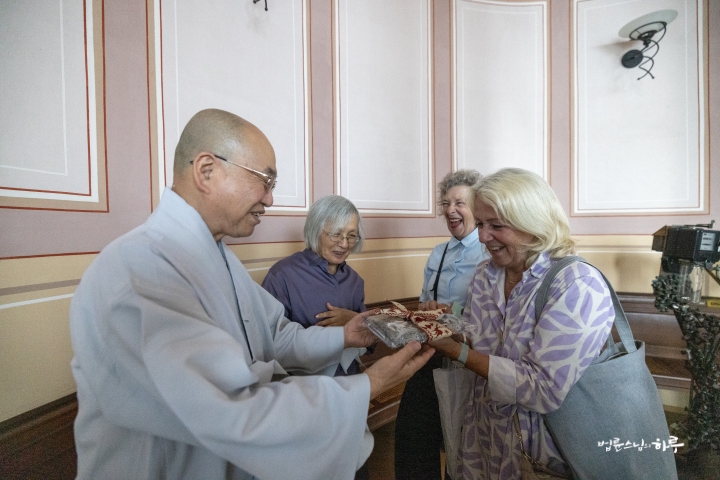
“Thank you for making this so thoughtfully. The hat looks really warm.”
After expressing his gratitude, Sunim wore the hat and took a picture together at the request of the person who gave the gift.
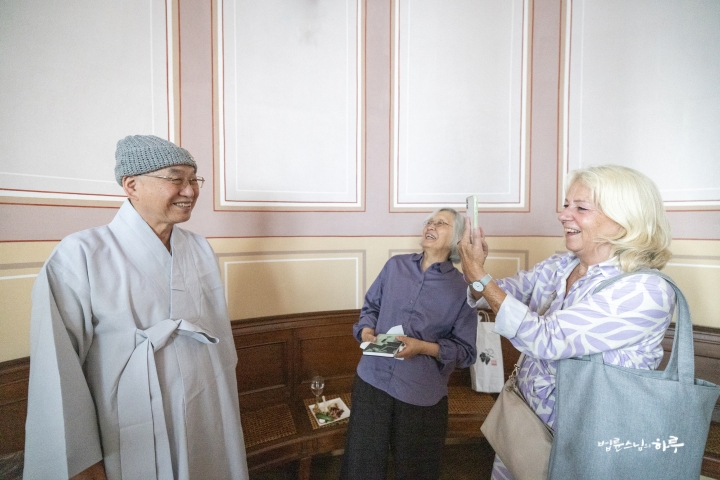
A moment later, a young man approached Sunim and asked a question.
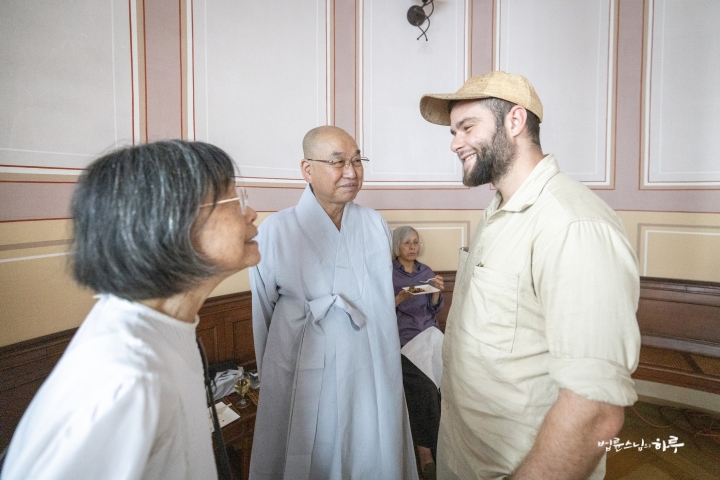
“I heard that there will be a Dharma Q&A with you on Sunday. I have work so I can’t attend your lecture, but may I ask a question now?”
Sunim gladly agreed to the conversation.
“How does Buddhism explain or teach about sin?”
“There is no such thing as sin originally.”
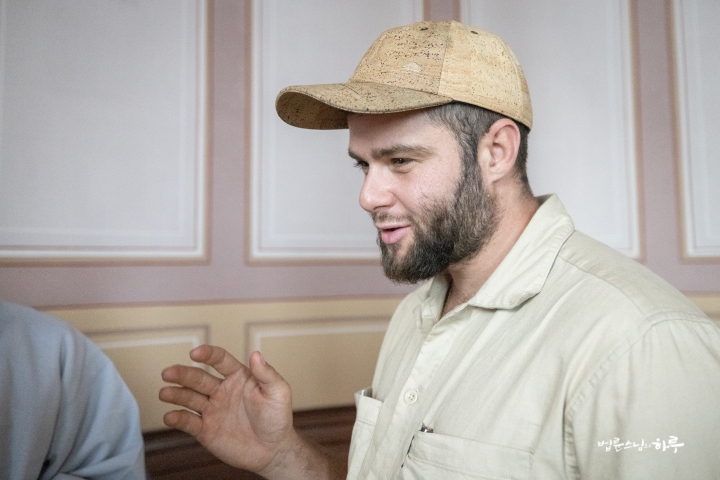
“Is this limited to sin? Or do you see everything as an illusion?”
“When we wear clothes, there’s no set way to wear them, we wear them according to the situation at the time. Like that, sin is not something that is originally set. Sin changes according to the rules that people set at each time. There is no objective entity of sin, only our consciousness that recognizes sin.”
“For example, just as pants have pockets, doesn’t sin have some function or necessity? Isn’t sin absolutely necessary in human society?”
“Sin is just a consciousness that arises according to the situation at the time. There is no original sin or entity of sin. However, the concept of sin can help maintain some order, or conversely, it can have a negative function that makes people suffer.”
“I see.”
The young man expressed deep empathy with Sunim’s answer and continued with more questions.
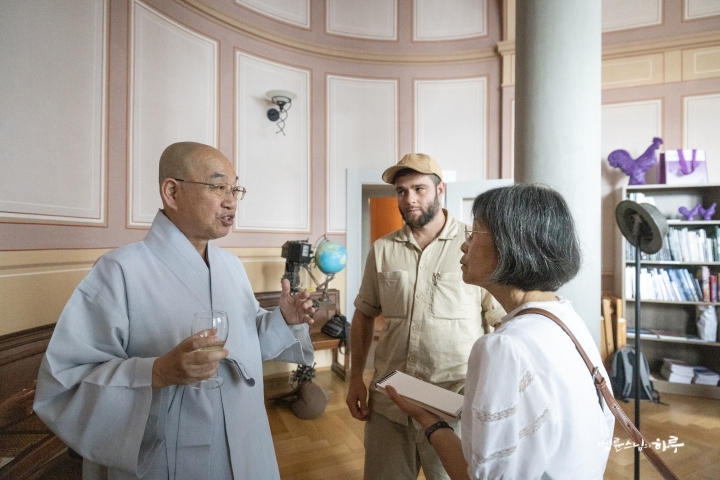
“I’m curious about your daily life. I’d like to know what kind of practice you do and how you spend your day.”
“The methods of practice differ by sect. Some places mainly do meditation, some mainly chant Buddha’s name, and some emphasize daily life. When I’m in retreat, I do intensive meditation for a while, but during the rest of the time, I only meditate in the morning and evening, and mainly give lectures, farm, or live an ordinary life.”
“The monasteries in Switzerland are becoming empty. It’s because young people are not entering. Is the situation similar in Korean temples?”
“In the past, you had to become a monk or take a certain form to practice, but now it’s an era where anyone can meditate if they want to. So young people don’t need to enter monasteries or temples anymore.”
“I see. That’s very interesting.”
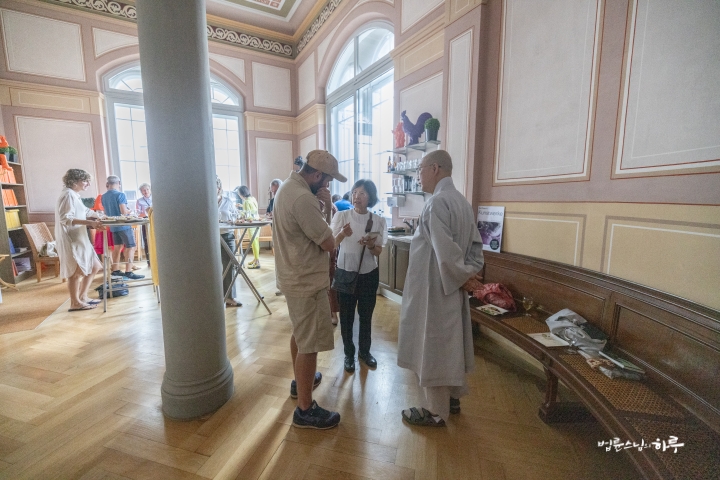
“In the past, you had to become a monk or nun to live alone, but nowadays many people live alone without being monks or nuns. The community culture is also changing. Now more people want individual freedom.”
“Is the decline of religion largely due to the influence of individualism?”
“Yes, that’s part of it, and changes in family structure also have an impact.”
“I understand. Your answers have been very helpful.”
Sunim and the participants spent meaningful time sharing their thoughts through conversation.
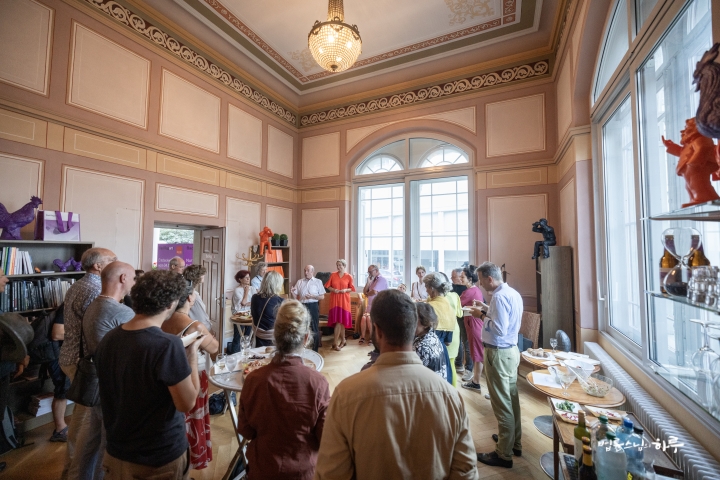
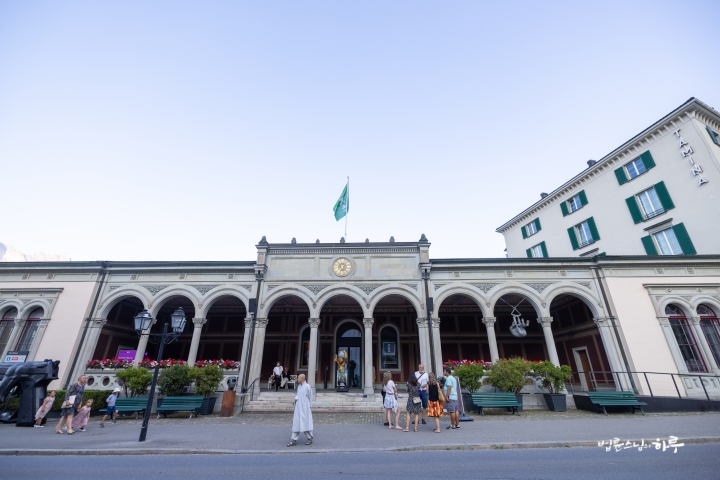
After dinner, Sunim and the participants walked back to the venue. On the way back, the Triennale sculpture works displayed throughout Bad Ragaz caught their eye.
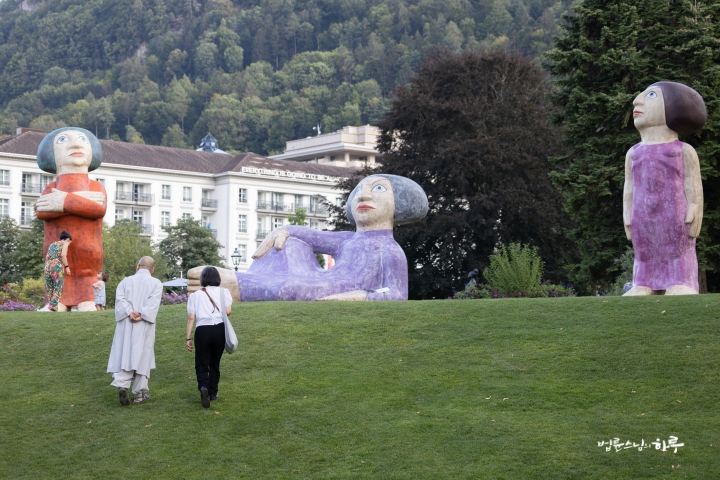
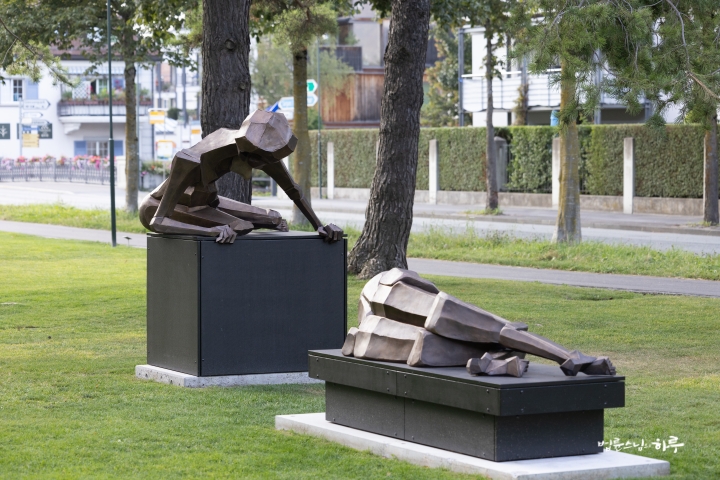
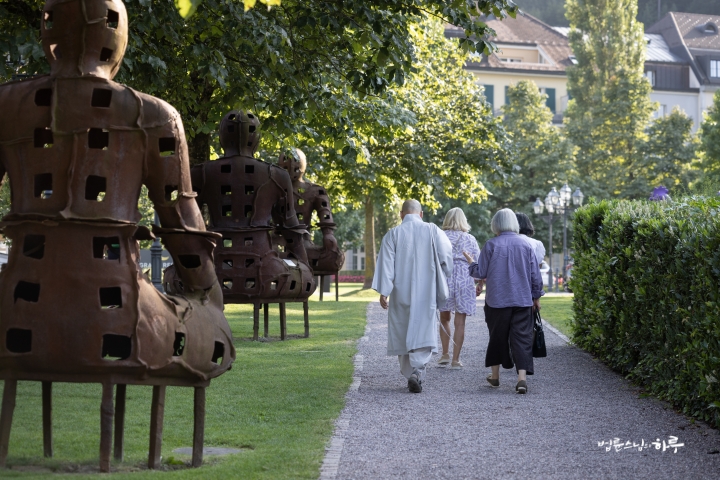
The entire city was decorated as a huge outdoor gallery. Famous sculptors from around the world participated and showcased various sculpture works, and the works installed throughout the city harmonized with nature and provided artistic inspiration. It was very impressive that it was an event where art and academia were integrated.
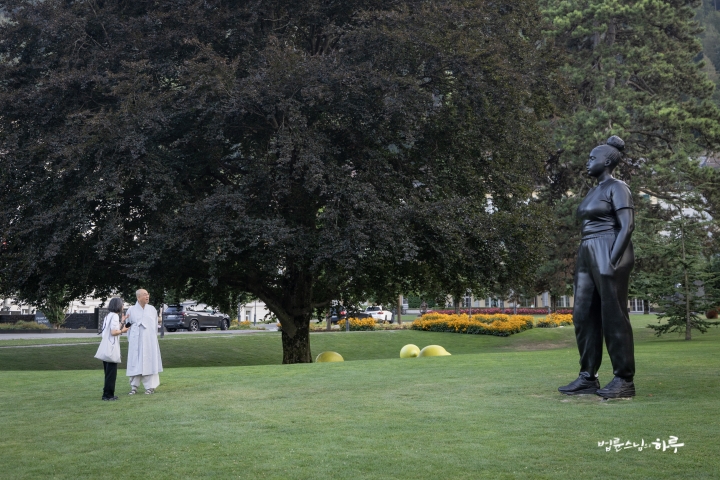
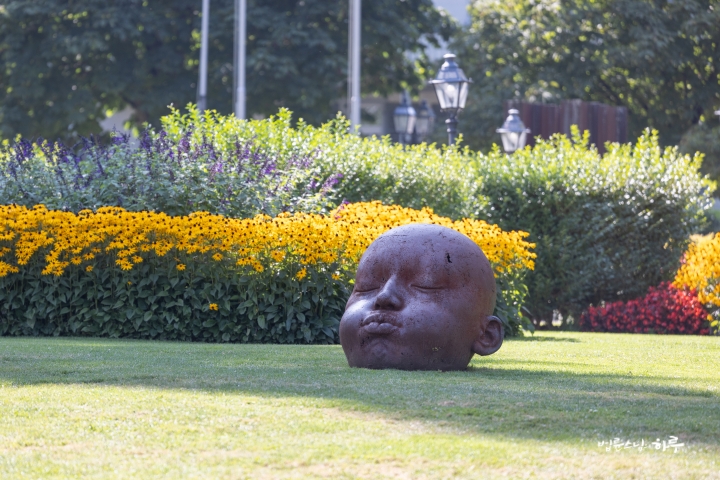
Sunim also took commemorative photos with the beautiful Swiss mountains in the background.
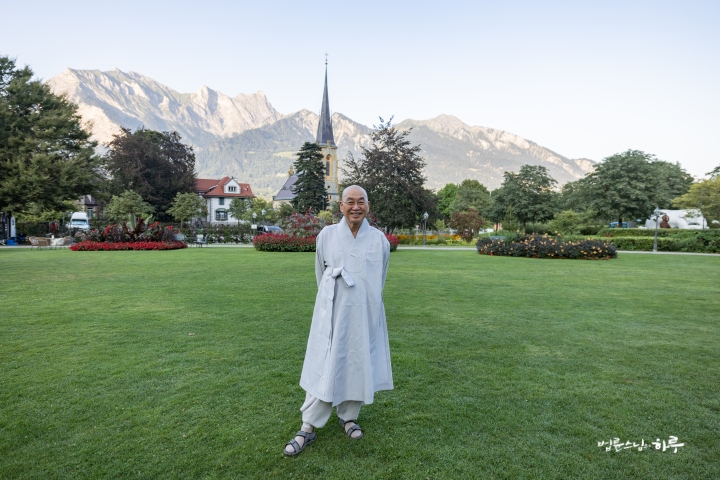
Upon arriving at the accommodation, Sunim finally unpacked, reviewed the content of tomorrow’s symposium, and proofread the manuscript. After finishing proofreading, Sunim took a brief nap around 9 PM. Due to the time difference with Korea, he had to give an opening Dharma talk at the Jungto Society joint meeting starting at 2 AM.

Tomorrow, he will give an opening Dharma talk and closing remarks until 9:30 AM, and from 9:40 AM, he will attend the second day of the symposium. He plans to listen to various topic presentations and discussions such as ‘Sin as a Relationship’, ‘Sin and Shame’, ‘Debt and Gambling in the Financial Casino Economy’, ‘Guilt in Sexual Situations’, and have conversations with the participants.
A Day in the Life of Sunim is translated by AI, edited by volunteers




